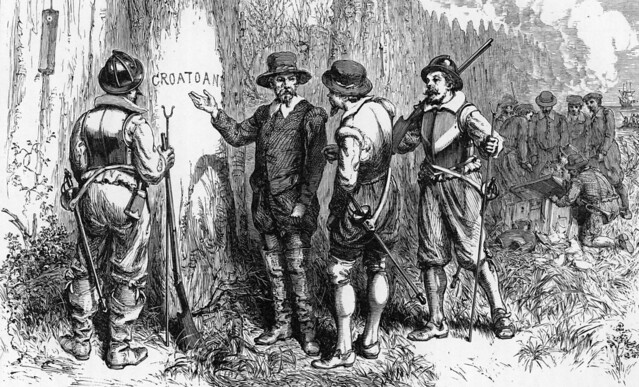
[Here's a two-sentence review of this piece: "Come for the history. Stay for the story." As Virginia's granddaughter, I am biased. But hopefully your assessment will match up with mine! Read on. . .]
"The Lost Colony" sounds
like "The Lost Atlantis," a myth or perhaps a ghost story, but North
Carolinians cherish their history of being the first port of entry,
thirty-three years before the Pilgrims famously landed on Plymouth Rock.
These first colonists
came in 1587 to Roanoke Island just off the North Carolina coast and apparently
were established when their ship set sail again for England to bring supplies
and more colonists. Four years later when the ship returned, the settlers had
vanished, and the only clue as to what became of them was the single word "Croatoan"
carved into a tree.
A pageant called "The
Lost Colony" is produced yearly near the coastal town of Edenton, and the
setting is constructed of materials that came easily to hand for the settlers,
who stripped young trees into poles which they lined up for fences.
These enclosures are
similar to the grape stake fences which screen off small gardens of another
early settlement, Georgetown. There houses are built flush with the cobbled
streets and lack the porches or veranda popular in the lower South, where "garden"
refers to the growing of vegetables and other areas surrounding a house are
called yards.
Mrs. Dunlap's son Duncan,
enamored of his fiancée, was also enamored of her family's house in one of
these stylish Georgetown neighborhoods with just such grape stake fencing. When
his mother was planning her new house as close as possible to Papa's house and yard,
Duncan ordered architect's plans for her in a style which if not as grand as
the Georgetown houses were at least distinctive, even peculiar, for the street
we lived on where every house, large or small, was introduced by a porch. The
plans stated that the style was Dutch Colonial; and when it was almost
finished, the Railway Express truck delivered another package from Duncan of a
size and shape puzzling to the Railway Express Agent, to the driver, and to all
those who watched him load and unload.
The house plans Duncan
sent ignored Mrs. Dunlap's need for a garage, which Duncan claimed was an
anachronism anyway, thus creating a lively discussion when Mrs. Dunlap passed
on his comment after looking the word up before going to The Book Review Group.
Duncan's ongoing effort
to educate his mother to the level he had attained through seven years of
higher education included his frequent use of words such as anachronism
with accompanying instruction. Contrary to what one might expect, his mother
enjoyed these lessons and practiced what she learned on her neighbors,
especially my mother, and on other members of The Book Review Group. There was
sometimes a certain nervousness about her conversation, a studied manner in
which she would say, "That reminds me" when the prior connection was either
faint or nonexistent, and the listener was surprised by a discourse alien to
Mrs. Dunlap's usual downhome manner.
"Duncan means well, I
suppose," my mother said, "But he's trying to make a silk purse out of a sow's
ear," blushing with embarrassment the minute she realized what she had said. "Of
course, I don't mean that the way it sounds."
The garage that Mrs.
Dunlap's contractor, who claimed he did not need any particular plans, put up
for her was lacking in aesthetic appeal; but the lot being so small and the
house being so large for the lot, the main problem was that the garage and the
clothes line were necessarily placed in the only available space remaining and
stuck out like two sore thumbs.
Duncan, soon to be
married, doubtless wanted his mother's house when he brought his future bride
to meet her to look as attractive as possible, perhaps to look as non
small-town Southern as possible without his seeming to express disloyalty to
his upbringing. If Mr. Dunlap, Sr., had lived long enough to experience this
phase of Duncan's ambivalence towards his hometown, he might have encouraged
Mrs. Dunlap to be less malleable; but as it was, Mrs. Dunlap was pretty much
putty in Duncan's hands. Mr. Dunlap, Sr., for instance, like Papa, had been opposed
to new-fangled conveniences of all kinds and refused to get into a bathtub,
citing with dramatic flourishes that the one time he tried it he slipped and
nearly broke his neck. He would doubtless have been shocked to learn that
Duncan had talked Mrs. Dunlap into having two bedrooms upstairs, one with a
stall shower, the first such arrangement in the memory of her contractor, as
well as a basement with furnace for central heating.
Papa's house, by
contrast, only recently had been modernized to the extent of installing thermostat-controlled
oil-burning stoves to replace the old cast iron wood-burning stoves.
Unfortunately, the oil barrels were installed on Mrs. Dunlap's side of the
house and were unsightly to say the least, but in no way an aesthetic irritant
to Papa, who stayed indoors in bad weather and otherwise sat on the front porch
where he avoided seeing Mrs. Dunlap's house altogether. His former brisk walk
uptown, his daily constitutional, had been reduced by the infirmities of age to
puttering around in the back yard when the weather was nice.
It was soon after Duncan
and his fiancée announced their engagement to Mrs. Dunlap that the Railway Express
truck drove through our backyard (not everyone knew how keenly Papa resented
that liberty) right up to Mrs. Dunlap's kitchen door and unloaded the bundle of
grape stakes.
[First third of an undated story by Virginia McKinnon Mann. Click here for the second installment. Roanoke illustration via State Archives of North Carolina.]

No comments :
Post a Comment
Comments are welcome!